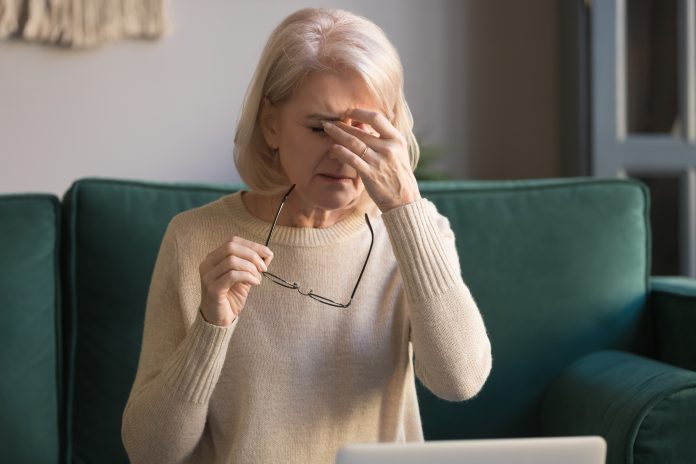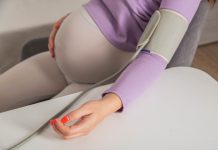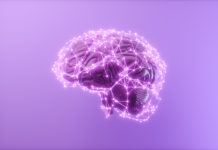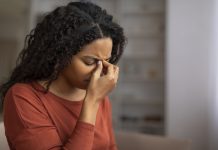Mamta Trivedi, MCOptom DipTP(IP), a Specialist optometrist and advisor to Feel Good Contacts, shares tips on how to get through the working day when you’re menopausal and suffering from dry eye syndrome
Going through the menopause can be difficult for many women, but when you’re stuck in the office, away from your lockdown home working comforts, the feelings of discomfort are exacerbated. Symptoms such as hot flushes, fatigue (due to insomnia), memory problems, dizziness and painful joints are expected as they are well documented. Added to this challenge is one of the lesser-known symptoms – Dry Eye Syndrome.
Common symptoms of Dry Eye Syndrome include dryness, light sensitivity, blurred vision as well as burning, gritty and sandy feelings. Despite suffering from Dry Eye Syndrome, your eyes will be watery. These teary eyes are actually a sign that your eyes are trying to make up for an ineffective tear film.
According to the Society of Women’s Health Research, 62% of perimenopausal and menopausal women suffered from dry, itchy eyes, but only 16% realised menopause was to blame. Just under 59% sought medical advice about their dry eyes, and 58% had tried to treat their eyes with OTC remedies.
Why does this happen?
Like most symptoms of the menopause, our hormones are to blame. In the year during the menopause transition, you’ll go through many hormonal changes. After menopause, your body makes less reproductive hormones. It is the lower levels of estrogen and androgens that can cause dry eyes.
Taking care of yourself at work
If you’re at work, then it’s essential to eliminate any unnecessary screen time as this can strain your eyes. While it is impossible in this digital age to completely escape from using a screen, there are small changes you can make that will make a difference to your eye health. Instead of firing an email to your colleague, try picking up the phone and talking to them. You could try to avoid having your lunch at your desk, and this will stop you from looking at your screen.
When you’re back at your desk and using your computer, lower the screen so that your eyelids also lower and decrease the evaporative surface. Do try to be mindful of how much time you’re spending staring at the screen. Simply looking away from your computer screen for a minute or so every now and again can give your eyes a much-needed break. Also, try and rest your eyes. When you’re deeply focused on a task, you tend to blink less, even if you don’t realise it. If you’re not blinking enough, your eyes are not receiving regular hydration and moisture from your tears. As a result, your eyes will begin to feel dry and irritated. Get into the habit of ‘resting your eyes’ by looking away and closing them purposefully, the eyelids are great protectors with lots of moisturising glands on the inside. I always follow the 20-20-20 rule: Every 20 minutes, take a 20 second break and look at something 20 feet away.
Dealing with pre-existing conditions
If you already suffer from dry eye syndrome or other eye conditions, then these pre-existing problems are likely to be exacerbated during the menopause. It’s fine to wear contact lenses during the menopause but some women feel that their dry eye condition makes wearing lenses less comfortable. In such cases, it’s worth visiting an optometrist who may be able to suggest alternative types of lenses. Or it may be the case that you have to avoid wearing contact lenses, switch to glasses and the optometrist will suggest appropriate lubricating drops.
Changes to your environment
Changes to your environment can also help to keep your eyes healthy, if possible, keep office air conditioning to a minimum (you may need it from time to time to keep hot flushes at bay) and invest in a humidifier to keep the air moist.
Would you need any treatment?
Treatment for dry eyes begins with artificial tears. OTC eye drops offer temporary relief, so I’d recommend starting with this. There are many different types to choose from, and the number of drops required, and length of treatment will depend on how dry and sore your eyes are. If eyelids are inflamed, then use a warm compress (microwaveable bean bag, or ‘warm’ compress applied over the eyelids for 5-10 minutes).
Also, your optometrist may prescribe different types of medication depending on your condition for example drugs to reduce eyelid inflammation, drugs to reduce cornea inflammation, drugs to stimulate tears or eye inserts which slowly release a lubricating substance throughout the day.
There is some evidence that the initiation of hormone replacement therapy may help alleviate symptoms.
Seek medical advice
In general, menopause symptoms and dry eyes linked to the menopause can last for four years after your last period, but some women experience them for longer. If you have any concerns, then I recommend that you seek medical advice as soon as you experience dry eyes. While it’s important to speak to your GP about any menopausal symptoms, it is a good idea to see an ophthalmologist or optometrist. They will be knowledgeable about the unique eye changes that occur during the menopause and offer bespoke advice on how to deal with your specific problems, diagnose them appropriately and refer you to a specialist ophthalmologist or optometrist for further advice and treatment.











